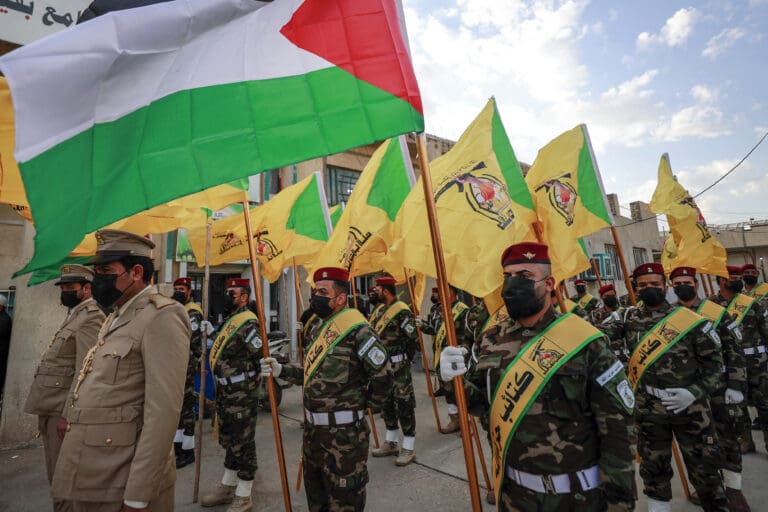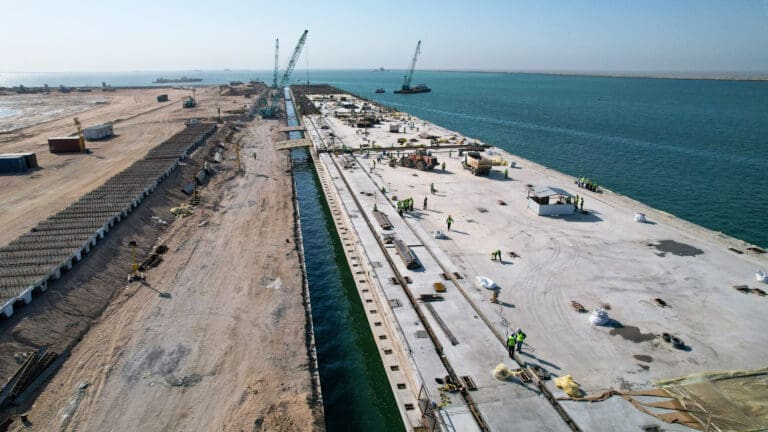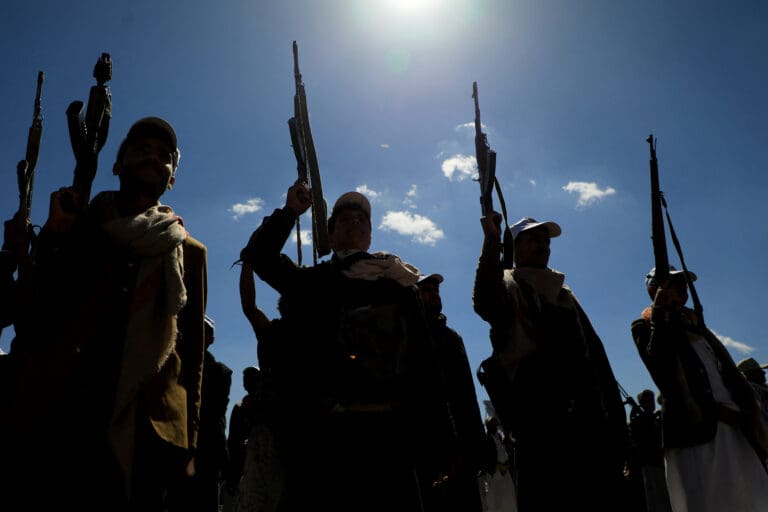
Iraq’s
Climate Crisis:
A Geopolitical Conflagration in the Making
Policy Note, June 2022
Iraq is the world’s fifth-most vulnerable nation to the effects of climate change, including water and food insecurity.1 But it is a threat that is inter-connected with a host of other challenges, creating a potential multiplier effect that could amplify socio-economic challenges, result in the proliferation of armed groups and create geopolitical flare-ups that have the potential to produce fresh waves of conflict in a country that is still struggling to secure the enduring defeat of terrorist groups, such as Islamic State (IS) and Iranian backed militia groups. Addressing climate-induced challenges will require a renewed effort to implement urgently needed reforms, in addition to securing a settlement with Iran and Turkey over-long standing water disputes that have wider geopolitical implications for peace and security.
Introduction
The suffering that climate change will inflict is not lost on Iraq’s population and ruling elite, but climate change also forms part of a long list of crises and daily challenges that the state, the ruling class and administrative structures are engulfed in, including the threat from terrorist and militant groups, economic and humanitarian challenges, and the global pandemic. This has diminished the political will to address climate related challenges, which currently feature at the margins of policy debates on economic diversification and the country’s dependency on hydrocarbons. However, focusing climate change on the imperative of diversifying the economy, and not as a challenge in its own right, is detached from a socio-economic landscape that is economically hemorrhaging and that has seen climate-induced drivers of instability amid a rising youth population, a bloated public sector, and dysfunctional governance.
Climate change could have far-reaching consequences unless it is addressed as part of a comprehensive policy agenda that is designed to address shortcomings in good governance. Failure to do so could see climate change and its effects contribute to the proliferation of armed groups by intensifying conflicts over increasingly scarce natural resources, water, and arable land, and expand recruitment spaces for terrorist groups as a result of climate induced increases in poverty. The notion of increased intra-state conflict should not be ruled out as disparate armed groups grapple for control of arable land and water resources; the possibility of an inter-state conflict between Iraq and Turkey, or between Iraq and Iran over access to water, is improbable but the geopolitical flare-ups that have resulted to-date as a result of Turkey and Iran’s restriction of water flows into Iraq could see increased attacks on their forces that will exacerbate ongoing violent conflicts between rival armed groups and disparate factions.
To address the problem, the Iraqi government must focus on the threat of climate change as a public policy issue, but also a threat that is interconnected with a host of other challenges that combine together and provides climate change with its multiplier effect. This will require a renewed effort to deliver services, balance short-term economic grievances with the long-term imperative of austerity measures and good governance reforms; and a renewed effort to achieve a resolution with Turkey and Iran that addresses the possibility of an expanded conflict within Iraq’s borders that will have a spillover effect within Turkish and Iranian borders. This approach will also spur actionable policy outcomes that can alleviate geopolitical tensions with Iran and Turkey, establishing a more cogent and unified approach from different Iraqi political actors who have varying ties to regional actors.
Water Crises and Geopolitics
The red flags are already there in Iraq to indicate severe near-term implications for national stability. Iraq is among the most vulnerable in the world to climate change, with the United Nations highlighting the devastating toll it could have on water supplies, food production systems, and its potential to enable breeding grounds for terrorism and violent extremism.2 Average temperatures are increasing at a rate that is 2-7 times faster than the global average.3 Desertification affects 39 percent of the country and 54 percent of agricultural lands are degraded because of salination caused by reduced water flows of the Tigris and Euphrates.4
Around 70 percent of Iraq’s water resources flow from neighboring countries into the Tigris and the Euphrates rivers5, which flow through Turkey, with 80 percent of Iraq’s water going toward agriculture.6 Geopolitical flare-ups have been in the making since December 2020, when Turkish dams cut the flow of the Euphrates to neighboring countries by 60 percent, which has resulted in food and power shortages.7 Turkey justifies the building of dams such as the Ilisu Dam on the basis that it provides a vital source of hydropower that is central to its water and irrigation management but it has produced a water crisis that could see at least seven million Iraqis lose access to water.8 Turkey controls more than 90 percent of the water that flows into the Euphrates and 44 percent of the water in the Tigris but has been accused of weaponizing water supplies as it grapples with the conflict in Syria and the Kurdistan Workers’ Party (PKK).9
Similarly, upstream dams in Iran have shrunk the Tigris tributaries, cutting off flow at the Diyala river in Iraq’s north-east. Lake Hamrin, Diyala province’s main water source, has lost nearly 80 percent of its water, embroiling the province in both a humanitarian and environmental calamity.10 The Kurdistan Regional Government (KRG) and Iraq’s Ministry of Water Resources have accused Iran of rediverting the Tigris in the north and have derided it for violating international law but the counter from Iran’s perspective is that it is limiting water flows whose origins are in Iran, and not the Kurdistan region.11 Iran’s motive for building dams centers around the prospect of a major water shortage in the country by 2036, and the fact that two-thirds of Iran’s 10.2 billion cubic meters of water that exits the country flows across into Iraq.12
The Kurdistan region, with the tacit acceptance of Baghdad, has moved to establish a project dam in direct response, on the basis that the failure to do so would otherwise see river flows decline by at least 50 percent within the next decade.13 The dams will generate power and provide water for agriculture and tourism but aid groups have warned this is not a long-term fix since the project is unlikely to be fully implemented. These flare-ups will also increase because of the vested interests that powerful, Iranian Revolutionary Guard Corps (IRGC) groups and individuals have in lucrative commercial projects by the border, development projects that have long been managed and implemented by IRGC affiliated companies.14 These interests mean that there will most likely be some collusion on the part of authorities or informal actors in Iraq, both in Baghdad and the Kurdistan region; the Iranian regime co-opts actors to ensure these projects develop without interruption, or to prevent the Baghdad and Erbil governments from mounting any political or diplomatic efforts to undermine them.
The Specter of Conflict
While the implications of climate change are widely reported on, its implications for the security environment remains under-studied and under-reported, particularly where this concerns armed groups. In 2014, IS took control of the water infrastructure, which allowed it to acquire legitimacy or to punish its enemies and the communities under its control; in some instances, it taxed access to water, while in others used it to force populations from their homes. In December 2014, IS was reported to have poisoned drinking water with crude oil.15 Similarly, according to interviews, Shiite militias have consolidated their positions to ensure they have full control over water infrastructure in the north, which has prompted concerns and condemnation from local Sunni Arab communities and minority groups, who fear they could use the same tactics as IS to exert their influence and control.16
In 2019, the United Nations International Organization for Migration reported that 21,314 Iraqis had been internally displaced due to lack of potable water17, a number which is expected to increase exponentially since Iraq will face a deficit of 10.8 billion cubic meters of water by 2035,18 while 54 percent of Iraq’s arable land is under threat because of increased salination.19 In other words, the crisis creates the breeding ground for militias and criminal enterprises to expand their numbers and stranglehold over a society that will become increasingly desperate and destitute. Given this pressure and rising demand for water, tension between tribes over water is already on the increase. The UN reports Baghdad and provinces like Missan and Dhi Qar are regularly engulfed in conflicts that result from drought and lack of water.20 Further intra-community clashes and increased fractures within society are expected; local councils in Missan and Muthanna, for example, have accused northern provinces of taking more water than they deserve, suggesting that water, like oil, could become a major driver of discontent and unrest.21
Geopolitically, Turkey’s decision to fill its llisu dam at the origins of the Tigris in June 2018 prompted widespread protests amid the sweltering heat, and triggered condemnation across the Shiite ruling class, with supporters of Muqtada al-Sadr and the Popular Mobilization Force (PMF) being particularly vocal against Turkey’s actions.22 Militia leaders have seen their ranks swell since climate-related crises have struck Iraq. For example, thousands of militia fighters had in fact previously left the PMF to return to their towns and cities in the peripheries and remote hinterlands, but these were devastated by drought and water scarcity, leaving the fighters with no choice but to rejoin the PMF and its militia factions.23 Moreover, climate-induced migration has produced slums in cities, enabling opportunities for militias and criminal networks to grow.24
Similarly, Turkey’s construction of dams may be designed to force Kurds away from rural areas and out of Turkey’s south-eastern hinterlands, and therefore deprive the PKK and its affiliates of recruits and territory that allows it to continue its guerrilla warfare but because of the anger it has generated and the defiance of local communities, Turkey’s actions have enhanced the PKK’s popularity and ability to attract fighters, including the mobilisation of fighters in northern Iraq. What makes security conditions all the more precarious is that the past year has seen an increase in attacks, some unprecedented, on Turkish forces: Iran-aligned militias have drawn on growing discontent toward Turkey and have targeted Turkish personnel in northern Iraq amid growing tensions over the future of Sinjar and Turkish interventions to rid the area of PKK fighters.25
Iran-aligned militias are propped up by the increase in anti-Turkish sentiments in the country, allowing them to position themselves as nationalists. As climate-related challenges grow, such groups will exploit the implication of Turkey in crises like that facing water supplies, providing a pretext for undertaking attacks that are tied to other domestic and geopolitical objectives. Conversely, the Iraqi government, currently at odds with Iran and its allies in Iraq, could start to endorse, tacitly accept or acquiesce to attacks by rebel Iranian Kurdish groups on Iranian forces stationed along the border with Iraq, or their proxies in Iraq, if Tehran refuses to reverse its water policy toward Iraq.26 These dynamics and trends indicate the potential for pre-existing and long-standing conflicts to produce second and third-order effects that could be triggered by climate and water-related crises.
Moving Forward
Iraqis consume 392 liters per capita27 daily, while the international average is 200 liters per capita. This means that overconsumption and undersupply will be directly responsible for unrest and instability. Some ruling elites have used the climate crisis to burnish their reputational standing, with President Barham Salih initiating the Mesopotamian Revitalization’ initiative that, on paper, aims to be the framework for developing an environmental strategy by modernizing water administration of the Tigris and the Euphrates rivers, generating clean energy, and encouraging investment through a green climate fund.28 But save for such public affairs exercises, there is no real dedication to treating the crisis as a crisis in its own right; instead, climate-related challenges are treated as a sub-set of outstanding socio-economic challenges.
Geopolitically, the Iraqi government has in the past submitted a formal complaint to the UN to contest Iran and Turkey’s water policies.29 However, the complaint was never followed through, and others will most likely be torpedoed in similar fashion because Iraq’s foreign policy is not centralized or implemented by institutions but by ruling elites that have varying ties to regional powers.
Still, all is not lost. While it may be some time until Iraq can remedy the structural and administrative challenges that prevent it from addressing all climate-related challenges, Iraqi and international actors can focus their efforts on preventing a major domestic or regional conflagration: firstly, by including climate and water crises into conflict mediation dialogues currently focused on geopolitical tensions, such as that between Iran and the Arab world; secondly, by including the water crisis in negotiations with Turkey over the future of Sinjar and the presence in Iraq of PKK fighters; finally, by establishing a forum that functions as a collective through which current and evolving threats can be addressed.
These efforts should be premised around the cross-border implications that Iraq’s water woes and climate-induced socio-economic grievances will have. Both Iran and Turkey can ill-afford severely weakened administrative structures in Erbil and Baghdad, lest this expands the space in which armed groups and militant organizations thrive and swell their ranks, particularly the actors that are currently engaged in a conflict with Turkey and Iran. Moreover, Turkey and Iran continue to have vital strategic interests in Iraq, including Turkish military personnel, that will become vulnerable to public resentment and hostility from conventional and unconventional security forces who could adopt coercive measures to penalize Iraq’s neighbors in response to their water policies. In other words, violent flare-ups resulting from the dispute could have immediate national security implications for Turkey and Iran that should provide them with sufficient reason and incentive to engage in dialogue and work on finding a lasting solution to the crisis.




